
Publisher:
Bonnie King
CONTACT:
Newsroom@Salem-news.com
Advertising:
Adsales@Salem-news.com

~Truth~
~Justice~
~Peace~
TJP
Aug-16-2012 02:16

 TweetFollow @OregonNews
TweetFollow @OregonNews
Escalating Tension between Pakistan and Afghanistan and the Necessity of Self-Restraint
Pir-Mohammad Mollazehi for Salem-News.comPakistani officials charge that Taliban leaders are now running training and logistic bases in Konar province of Afghanistan.
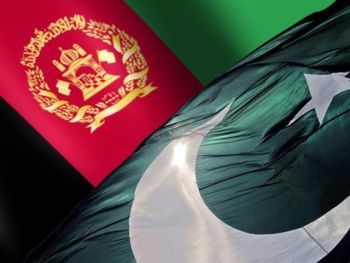 Courtesy: iranreview.org |
(TEHRAN Iran Review) - Rehman Malik, advisor to to Pakistan’s Prime Minister Raja Pervez Ashraf on Interior Affairs, is the highest ranking political official in the country to have charged the Afghan government of supporting Maulana Fazlullah, one of the Taliban leaders.
Pakistani military officials had already made recourse to similar allegations to explain certain military measures they had taken along the common border with Afghanistan.
However, in a recent trend, state officials of both Pakistan and Afghanistan have been exchanging incriminations about the other country’s support for groups which oppose them and are usually categorized under the general heading of terrorism.
Such recriminations will not only prevent normalization of relations between the two neighboring countries, which have many interrelated needs, but may also pose serious threat to national security of both of them.
Of course, this possibility cannot be denied that Maulana Fazlullah and Maulana Hafiz Gul Bahadur, two Taliban leaders in Pakistan who were defeated by the Pakistani army during a conflict in Swat Valley and then retreated into the mountains, might have taken refuge in Afghanistan.
 |
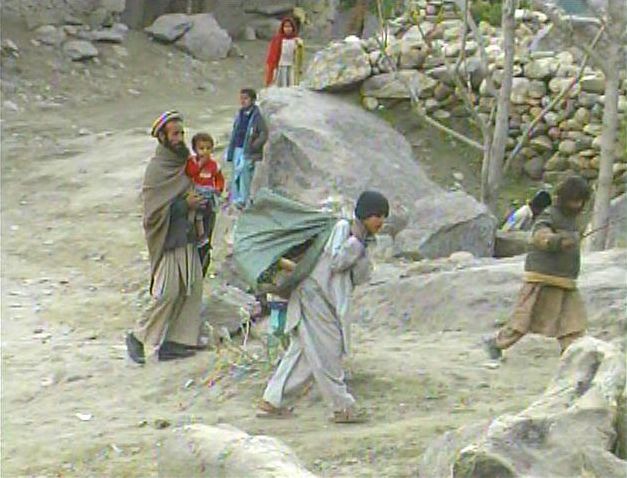 Family in Afghanistan's Kunar province. |
In their allegation, Pakistani officials have noted that both Taliban leaders are now running training and logistic bases in Konar province of Afghanistan and are supported in their efforts by certain elements of the Afghan government.
From those bases, they say, the Taliban leaders are guiding military operations against Pakistan’s army in tribal regions as well as in Khyber Pakhtunkhwa province of Pakistan.
The government of Afghanistan, however, has rejected Pakistan’s claims arguing that the Taliban group in Afghanistan which includes Haqqani network as well as the Islamic Party of Gulbuddin Hekmatyar are fighting against the government in Kabul and are supported by the intelligence service of Pakistan, ISI (Inter-Services Intelligence), which has provided them with a powerful central base in that country.
Afghan officials have also noted that continued shelling and firing of rockets at border areas beyond Durand border line into Afghanistan’s Konar, Nouristan, Khost, and Paktia provinces by Pakistani army is aimed at helping members of Haqqani network to penetrate deep and establish their bases inside Afghanistan.
 Entering Paktika province. |
To explain their view, they have referred to NATO’s pressure on Pakistan to deploy its army units to North Waziristan province. North Waziristan province is the main base of Haqqani – al-Qaeda network and other terrorist groups that are affiliated to them, but for unknown reasons, the Pakistani army has been so far not willing to deploy its forces to North Waziristan. The reluctance of the Pakistani army for launching an all-out attack on North Waziristan has deepened the rifts between the United States and Pakistan.
This is why operations against al-Qaeda and affiliated groups by the US unmanned aerial vehicles (also known as drones) have continued despite frequent requests from Islamabad for a halt on these operations. Pakistan considers drone attacks a blatant violation of its national sovereignty which has tarnished the credit of the country’s armed forces before Pakistan’s public opinion because people say that the army cannot defend the country’s territorial integrity against foreign invasion of a part of the national territory of Pakistan.
 |
 Another shot of Afghan civilians in Kunar. |
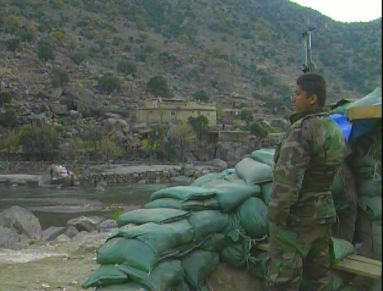 Afghan soldier stares across the Pesh River toward Pakistan |
In reality, such ambiguous circumstances have led to the emergence of a new line of thinking among nationalist Afghans who believe that Pakistan pursues two kinds of policies toward Afghanistan: one policy which is publicly proclaimed and the other one which is practically followed with regard to Afghanistan.
They say that proclaimed policy of Pakistan apparently supports peace and stability in Afghanistan and the government of President Hamid Karzai. However, its practical policy is supportive of the armed terrorist groups which are trying to disturb peace and security in Afghanistan and which are backed by Pakistan’s army and the intelligence service, ISI. As a result, they argue, Pakistan’s strategy is not to maintain peace and stability in Afghanistan.
This is not a new line of thinking in Afghanistan in relation to Pakistan’s policies toward Kabul. It has been there since Sardar Mohammed Daoud Khan ruled the country.
At that time, when Daoud Khan was prime minister, leaders of the opposition Islamic groups fled to Pakistan’s Peshawar and were supported by the then Pakistani Prime Minister Zulfiqar Ali Bhutto.
However, the only thing that is new is the strengthening of a political current in Afghanistan which says the country should adopt a policy similar to that of Islamabad. They mean that in its declared policy, Afghanistan should put the highest emphasis on the necessity of cooperating with Pakistan and put this stance high on its media publicity agenda. However, in practice, it should support armed opposition groups which seek to destabilize and disintegrate Pakistan.
 |
The mastermind of this line of thinking is the Afghan Mellat Party [also known as the Afghan Nation Party or the Afghan Social Democratic Party], which is led by Mr. Anwar al-Haq Ahadi.
Some analysts believe that the military and security systems of Afghanistan have already accepted this kind of thinking as a principle of deterrence against what they call Pakistan’s meddling in the internal affairs of Afghanistan. Clear remarks made by Rehman Malik attest to this fact.
It seems that the core element of this idea is taking serious retaliatory measures against Pakistan’s actions in order to make Pakistani authorities understand the untoward consequences of what they are doing with respect to Afghanistan.
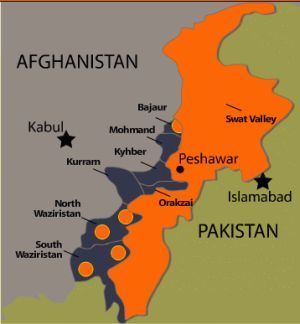
Therefore, Pakistan is faced with two limited options:
1. To give up support for Taliban – Haqqani network as well as the Islamic Party of Gulbuddin Hekmatyar; or
2. To brace for the continuation of a civil war, which will be supported by foreign elements.
Neither of the two options is compatible with the militarized power structure in Pakistan and the strategic interests that the country follows, though this may not be the case in the political section of the government. A more important goal, however, for Pakistan is to get Afghans recognize the Durand border line; Afghans have so far refused to do so.
Pakistan is probably hoping that it can capitalize on apparently favorable conditions provided by the presence of the United States and North Atlantic Treaty Organization (NATO) in Afghanistan and draw their attention to the root cause of the problem between Pakistan and Afghanistan by increasing tension along the common border.
In this way, Islamabad aims to solve the problem regarding Durand border line in its own favor, before it is too late, especially considering that in the current power structure in Afghanistan, leaders of non-Pashtu ethnic groups have indicated their willingness to accept the Durand border line.
 |
In reality, however, Pashtu people have their own ethnic demands and the strategic goals that they pursue is, like Pakistan’s strategic goals, multidimensional, and they cannot easily overlook those goals.
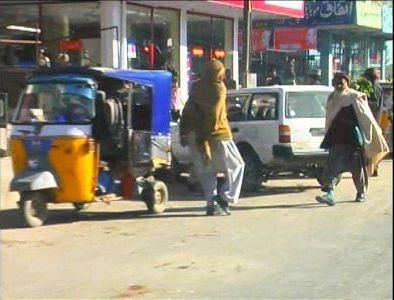 Near Jalalabad, Afghanistan |
The political crisis in Afghanistan’s parliament, which followed after Pakistan army fired rockets at Konar and Nouristan provinces and led to dismissal of two key ministers of defense and interior, can be explained along the same lines. It seems that the power to take initiatives is being gradually taken from party-based governments to be transferred to security apparatuses both in Pakistan and Afghanistan. If this actually happens, both countries will be ultimate losers of this game.
If there would be a winner, it is the United States which has managed to keep both countries dependent on itself more than any time before. Also, Washington will be able to force Afghanistan and Pakistan to accept establishment and presence of US military bases on their soils for long periods of time under the pretext of protecting peace in South Asia.
As these critical conditions continue to govern relations between Pakistan and Afghanistan, the policy of retaliation and tit for tat is gradually finding serious supporters in Afghanistan. At the same time, Pakistan is not able to give up its past double policies toward Afghanistan. As a result of the above developments, future outlook for peace and security in South Asia seems bleaker than any time before. However, all hope is not lost yet.
 |
Therefore, if Iran decides to draw on its past experiences, it can play a powerful mediatory role between the two countries in view of Tehran’s friendly relations with both Islamabad and Kabul.
Otherwise, the policy of retaliation will put both Afghanistan and Pakistan in a vulnerable position and may even bring them to the brink of disintegration along ethnic lines. In a worst case scenario, the crisis may finally lead to Talibanization of power in Kabul and Islamabad by radical Islamic groups which are supported by either side.
More By Pir-Mohammad Mollazehi:
*Turkey and the Issue of Syrian Kurds: Possible Consequences of a Miscalculation: www.iranreview.org/content/Documents/Turkey-and-the-Issue-of-Syrian-Kurds-Possible-Consequences-of-a-Miscalculation.htm
*The Arab World and Power Challenge: http://www.iranreview.org/content/Documents/The-Arab-World-and-Power-Challenge.htm
*Shanghai Cooperation Organization: Entering the Big Game: www.iranreview.org/content/Documents/Shanghai_Cooperation_Organization_Entering_the_Big_Game.htm
Pir-Mohammad Mollazehi is an Expert on Pakistan and Afghanistan Issues
First published by iranreview.org; submitted to Salem-News.com by Firouzeh Mirrazavi, Deputy Editor of Iran Review.Org
 |
 |
Articles for August 15, 2012 | Articles for August 16, 2012 | Articles for August 17, 2012

googlec507860f6901db00.html
Salem-News.com:



Terms of Service | Privacy Policy
All comments and messages are approved by people and self promotional links or unacceptable comments are denied.
[Return to Top]
©2025 Salem-News.com. All opinions expressed in this article are those of the author and do not necessarily reflect those of Salem-News.com.